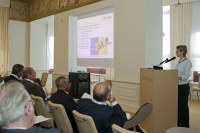 Improved electronic communications, Ahmedi says, are at the centre of the government of Kosovo's long-range science policy initiatives. The overall objective is "to place research and development in Kosovo in line with other European countries."
Improved electronic communications, Ahmedi says, are at the centre of the government of Kosovo's long-range science policy initiatives. The overall objective is "to place research and development in Kosovo in line with other European countries."
Ahmedi spoke at the TWAS-IAP conference, "Promoting Regional Cooperation in Science, Technology and Innovation in the Balkans." The meeting, which was attended by 60 participants from the Balkans region and Italy, was organized at the request of the Italian Ministry of Foreign Affairs.
Kosovo's five-year plan for developing ICTs, which began this year, "is intended to help boost economic growth and enhance the quality of life for all citizens." A large part of the effort, she notes, will focus on improving the management and distribution of government information. The goal is to ease bureaucratic bottlenecks and raise public awareness of government policies and programmes.
As for Kosovo's research community, she says, the initiative promises to facilitate timely access to scientific information and to draw the nation's scientists and scientific institutions closer to the European Research Area. Other goals include placing information and images of Kosovo's historic monuments and art work on the internet to promote scholarly research, citizen awareness and tourism.
ICTs not only promise to ease access to government information and enhance public appreciation of cultural and historic sites. It also has the potential to play a pivotal role in improving public health. As Francesco Sicurello, a professor at the International Institute of Tele-Medicine (IITM) in Como, Italy, observes, "e-health is already bringing significant changes to the diagnosis and treatment of disease across Europe."
Sicurello points to examples of e-health programmes in his home country, including the development of computer links between hospitals in Italy and Africa, which are enabling specialists in Italy to assess digital information concerning patients living in areas where such expertise is unavailable. These computer links are aiding the treatment of cancer, hypertension and heat disease for poor people in remote rural areas of Africa.
He also points to the development of computer links between urban and rural hospitals in Italy that are enhancing collaboration between medical professionals in his own country. These efforts, he says, are helping to improve health care, especially for the elderly.
Sicurello says that Italian hospitals currently engaged in e-health initiatives are eager to discuss how such efforts could be extended to hospitals in other countries, including countries in the nearby Balkans. Collaborative e-health care initiatives between medical researchers and clinicians, he asserts, "could lead to a greater sharing of information and expertise among physicians and medical groups."
As Igor Djurovic, a professor of electrical engineering at the University of Montenegro in the capital city of Podgorica, cautions, the ability to harness the potential of ICTs depends on the availability of adequate resources to develop an infrastructure that can meet a nation's needs. Montenegro, a country with just 650,000 people, has been unable to develop such an infrastructure on its own.
"With 95% of the market in the hands of foreign corporations and all product development taking place abroad," Djurovic says, the business community in Montenegro has been relegated to providing services for an infrastructure that is not of their own making. As a result, he says that the ICT sector in Montenegro, while growing, offers significant opportunities for future development.
The TWAS-IAP conference will continue through Friday. Other topics to be discussed include biotechnology, natural hazards, nanotechnology, physics and mathematics. The concluding session will examine the role of academies in the Balkans in providing evidence-based advice to governments.
For additional information, contact info@twas.org.

